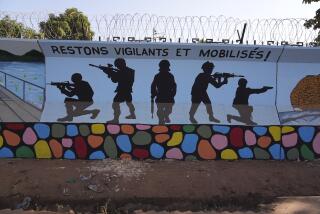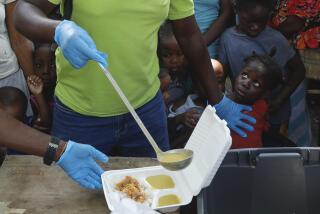Indonesia Fears W. Timor Will Be Next Tinderbox
- Share via
KUPANG, Indonesia — The angry militia members carried the headless corpse of their leader through the town of Atambua, looking for revenge.
After a year of living in squalid refugee camps in the province of West Timor and surviving on handouts from the United Nations, they knew right where to go: the Office of the U.N. High Commissioner for Refugees.
A mob of 6,000 gathered outside and screamed for the death of foreigners--any foreigners, one witness said. Militiamen with machetes and homemade guns swarmed the building, killed all three aid workers inside and then set the bodies on fire in the street.
Afterward, militia leader Joao Taveres urged the rioters to go home. “Three is enough,” he said.
The slayings Wednesday of the aid workers from Puerto Rico, Ethiopia and Croatia shocked the world and highlighted the explosive situation here in West Timor, where violent thugs from the paramilitary groups known as militias continue to roam freely a year after they went on a deadly rampage in neighboring East Timor.
Indonesian authorities and foreign officials fear that the situation will deteriorate further in West Timor and that the province is the troubled country’s next tinderbox.
The ongoing violence threatens to destabilize all of Indonesia, whose first democratically elected president, Abdurrahman Wahid, is widely perceived as erratic and weak and where the military remains a potent political force.
Reports of conflict between militia members and local residents in West Timor already have begun coming in from inland villages: two farmers killed Wednesday in the hamlet of Wanibesak; five villagers slain Thursday in Haekesak and six more killed there Friday. On Saturday, there were unconfirmed reports of at least 20 other deaths.
“We now face the risk of confrontation between the refugees and the local people,” said Col. Jurefar, head of the West Timor military district. (Like many Indonesians, Jurefar uses only one name.)
Wahid, who was in New York for the U.N. Millennium Summit when the killings in Atambua occurred, told reporters there that the timing of the attack was carefully chosen.
“The purpose was to humiliate me,” he said.
In the 48 hours after the killings, the United Nations evacuated its staff from the province, halting the distribution of food supplies to the nearly 127,000 East Timorese refugees who live in more than a dozen camps in the border region.
“We are faced with a new problem--where are the refugees going to get food?” said West Timor Police Chief John Lalo in Kupang, the provincial capital. “These people will most likely turn to theft, and they will most likely start stealing from their neighbors. We desperately need the continuing help of the international community.”
The deaths of the three U.N. workers is an echo of the violence that erupted last year in East Timor after the province voted in a U.N.-sponsored election to secede from Indonesia.
In advance of the election, the Indonesian army organized the militia groups for the stated purpose of maintaining order for the election.
The militia members, however, were recruited from East Timor’s criminal element, and their real job was to intimidate the electorate into voting against independence. The army, which had long operated profitable enterprises in East Timor, strongly opposed secession.
When the people of East Timor voted to break away from Indonesia, the militia members ran amok, killing hundreds of people, destroying large numbers of buildings and forcing more than 250,000 refugees to flee to West Timor.
The U.N. sent in Australian peacekeeping troops, and the militias withdrew across the border into West Timor, where they moved into the camps set up for the refugees. Operating with impunity, the militiamen used brutality and intimidation to dominate camp life. Even now, they prevent many refugees from returning home.
Some militia groups are widely believed to retain their covert ties to the Indonesian military. Few have been held accountable for their actions.
Under pressure from the United Nations to prosecute those responsible for the atrocities in East Timor, Wahid’s government announced Sept. 1 that 19 army officers and militia leaders would be put on trial for human rights violations.
One of the 19 was Olivio Mendosa Murok, a notorious militia leader from the Atambua area. Four days after he was named as a suspect, he was killed.
It remains unclear who was responsible. The police say Murok died in a gambling dispute. Prosecutors suggest that he was killed to keep him from implicating others. His supporters blame foreigners--whom they also blame for stealing their homeland during last year’s election.
“The refugees believe they lost the referendum in East Timor because they were cheated, and so they are angry at all white people,” Jurefar said.
Whoever they were, Murok’s killers were especially brutal. His head was cut off and dumped in a storm drain 500 yards away. His body was disemboweled, and his genitals cut off.
Revenge for Murok’s death began in the early hours Wednesday when a mob descended on the village of Wanibesak in the belief that some of the killers lived there. As many as 70 houses were burned, and two people were killed in the 3 a.m. raid.
The protests resumed the same afternoon when mourners brought Murok’s mutilated body to the town square in front of the local government building to call for the arrest of his killers. The U.N. office was 200 yards away.
The military and the police say they warned the U.N. staffers three times to leave the building before the mob arrived. The first warning came four hours beforehand and the last just as the crowd was marching down the street. Ten staffers went out a back door but three remained: Carlos Caceres of Puerto Rico, Pero Simundza of Croatia and Samson Aregahegn of Ethiopia.
“I certainly regret what happened in Atambua, but we obtained information that a demonstration was going to occur and we advised the U.N that all staff and vehicles should leave the office,” Jurefar said. “Three said they were under contract to work for [the refugee agency] and would stay there.”
There is no question that the aid workers knew the mob was coming.
“The militias are on their way, and I am sure they will do their best to demolish this office,” Caceres wrote in a poignant e-mail to a friend hours before he died. “We are waiting for this enemy, we sit here like bait, unarmed. . . .”
U.N. staff members who survived have said they expected that the Indonesian security forces would protect them. Instead, police and soldiers stood by as the three staffers were slain by the militiamen.
“They were in great numbers, and they were carrying sharp weapons,” Jurefar said. “It was very difficult.”
After the killings, the crowd was still not satisfied and marched to the police station.
“They were shouting that they wanted to find more foreigners to kill,” said Antonius Un Taolin, a West Timorese journalist who saw the scene unfold. “Police and military commanders tried to calm them down as they screamed for more blood. The crowd demanded that the U.N. never be allowed to return to West Timor.”
For now, at least, the mob will get its wish. The U.N. has no intention of coming back until the Indonesian government takes action to disarm the militias and lock up the killers.
The police have detained 18 suspects and witnesses, but none have been identified as the ringleaders.
Although Indonesian officials would like the U.N. to return and resume feeding the refugees, Police Chief Lalo said his department is not prepared to take the steps necessary to guarantee the safety of foreign aid workers.
“The local people have lots of homemade weapons, and they don’t want to give them up,” Lalo said. “These people are criminals, and they do their work in the middle of the night. Watching them all the time isn’t possible.”
More to Read
Sign up for Essential California
The most important California stories and recommendations in your inbox every morning.
You may occasionally receive promotional content from the Los Angeles Times.













